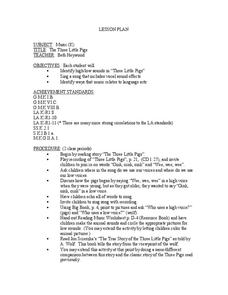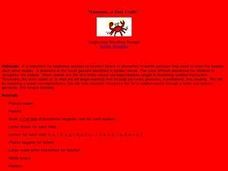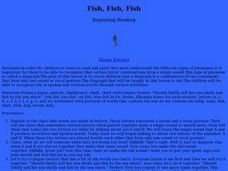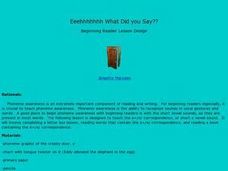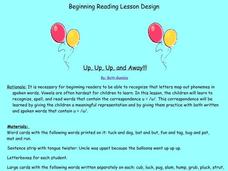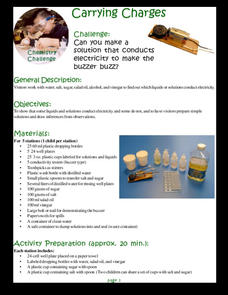Curated OER
The Alphabet of Coins
Students use letter/sound relationships of initial consonants to complete sentences that follow a given repeating pattern. These sentences be based on coin terms found on the U.S. Mint H.I.P. Pocket Change™ Web site.
Curated OER
Can You Open the Creaky Door?
Students recognize the short vowel e in written and spoken language. Through matching and listening activities, they discriminate the vowel sound /e/ from other phonemes. Students identify the phoneme and letter in words and pictures.
Curated OER
Load the Boat To Travel the Moat
Learners discover that letters stand for phonemes. They determine that spellings map out the phonemes that are found in spoken words. They analyze the correspondence, oa = /O/ and recognize the /O/ sound in spoken and written words in...
Curated OER
The Three Little Pigs
Students identify high and low sounds in the "Three Little Pigs" song, sing a song that includes vocal sound effects and identify ways that music relates to language arts. Before singing the song, they have listened to the teacher read...
Curated OER
E-E-E-E-Extra E-E-E-E-Effort
Pupils listen to a tongue twister emphasizing the short e sound. They practice writing the letter e and attaching different words with that sound to it. They listen to a book about a dog that enhances the letter e. They write a...
Curated OER
"Aaaaaaa...a Fast Crab! "
Students participate in an emergent literacy lesson that focuses on the skill of phonemic awareness. The phoneme chosen is the letter "a". They need to correlate the sound to the letter.
Curated OER
Iiicky, Stiicky, I
First graders recognize the short vowel i in written and spoken language. Through listening and matching activities, they discriminate the vowel sound /i/ from other phonemes. Students identify the phoneme and letter in psuedo words they...
Curated OER
Shelly Shark Goes Shopping
Students identify the digraph /sh/ in written and spoken language. Students practice the production of the /sh/ sound through words and tongue twisters. They identify the initial and final placement of the new digraph /sh/ through...
Curated OER
Fish, Fish, Fish
Students identify the digraph /sh/ in written and spoken language. After a brief discussion the independent and combined sounds of the phonemes /s/ and /h/ students practice identifying initial and final placement of the new digraph /sh/...
Curated OER
Eeehhhhhhh What Did you Say??
Student read pseudo words containing the e=/e/ correspondence and recognize sounds in vocal gestures and words. They explore the e=/e/ correspondence, or short e vowel sound and complete a letter box lesson, reading words that contain...
Curated OER
Jack the Fat Cat
Students recognize the short /a/ sound in written and spoken words in this lesson. They say a tongue twister which emphasizes words with the short /a/ sound. They then listen to the story "A Cat Nap" and identify the words in the story...
Curated OER
Silly Snake
Students practice recognizing and sounding out the letter S. They listen to the alphabet song, "Sea Shell," by Amy Lowell, and view a large picture of a snake in the shape of the letter S. Each student points out other objects found in...
Curated OER
Say Aaaaa for Apple
Students say words by blending sounds and phonemes. They decode words in order to read and identify and understand the letter a. This phoneme /a/ is one of the short vowels that are needed to read and write. They will show example of...
Curated OER
EA Words
Students determine if the "e" sound is long or short in words. In this language arts instructional activity, students practice discriminating between the long and short "e" sounds by practicing with word cards that are embedded in the...
Curated OER
Up, Up and Away
Students recognize the short vowel u in written and spoken language. Through matching and listening activities, they discriminate the vowel sound /u/ from other phonemes. Students identify the phoneme and letter in words and pictures.
Curated OER
Copycat, Copycat!
Students observe that sometimes the letter "c" is a copycat letter and sometimes acts like a "k" or an "s" like in the words "cat" and "race". They use Elkonin letter boxes and letters to spell words as they are called out by the...
Curated OER
/o/... I can't stop yawning!
Students investigate the phoneme, a meaningful representation, and the letter symbol for /o/ (short o). This lesson helps students recognize the /o/ in spoken words and begin to spell words with the assistance of letter boxes. Students...
Curated OER
Ending Consonants #13
In this ending consonant instructional activity, students say the sound of a letter at the beginning of a row, name pictures and circle the picture that ends with that consonant sound. A reference web site is given for additional...
Curated OER
Using HyperStudio to present a biography
Pupils read a biography, present the six focus statements (areas of information) onto a 3-D box, photograph their box with a digital camera, and create a HyperStudio card with voice and text.
Curated OER
I Am Tired
First graders recognize the short vowel o in written and spoken language. Through listening and matching activities, they discriminate the vowel sound /o/ from other phonemes. Students associate the phoneme with its letter representation...
Curated OER
Beginning Consonants 2
In this beginning consonants worksheet, students respond to 5 questions that require them to select the pictures of the words with that begin with each the listed consonants.
Curated OER
Shhhhh, the Baby's Asleep
Students identify the digraph /sh/ in written and spoken language. After a discussion of the independent and combined sounds of the phonemes /s/ and /h/ students practice identifying initial and final placement of the new digraph /sh/ in...
abcteach
Dragon Alliterations
You don't have to slay the dragon in this activity. Young writers review poetic devices with a set of worksheets about alliteration and similes. Once they finish waxing poetic about their dragon friends, they craft a final...
Sciencenter
Carrying Charges
What's all the buzz about electricity? Scholars take part in a scientific activity to test the conductivity of liquids and solutions. They first see if water, salad oil, alcohol, and vinegar cause a buzzer to buzz when electrodes are...



